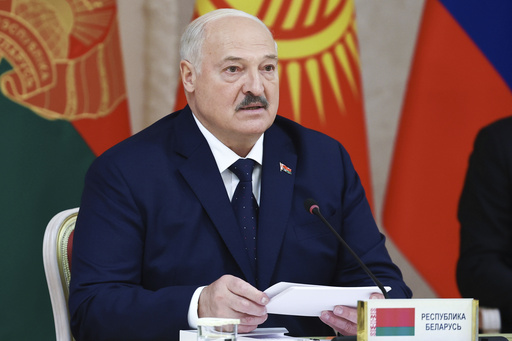In Tallinn, Estonia, authorities in Belarus persist in their relentless repression of dissent, despite showing signs of releasing certain prisoners, according to insights gathered from Belarus’s most prominent rights organization. Although the Belarusian government pardoned and set free 14 prisoners last month, they have reportedly detained at least 60 more individuals on charges deemed politically motivated, as shared by Pavel Sapelka from the Viasna human rights center. During the month of May alone, over 100 politically driven arrests were documented by the center.
“The harsh mechanism of repression continues uninterrupted,” Sapelka emphasized, highlighting the Belarusian administration’s unyielding measures to quell any form of opposition and their involvement in initiating significant new cases. “No one is truly safe in Belarus,” he warned.
The arrest and conviction of critics of the government have shown no sign of abating since 2020, following the controversial reelection of President Alexander Lukashenko for a sixth term, which was widely condemned by both the opposition and Western entities as fraudulent. The situation sparked mass demonstrations, the largest in Belarus’s history, met with severe crackdowns by the authorities who arrested, detained, and allegedly abused thousands. This response prompted extensive international criticism, subsequently leading to sanctions by both the U.S. and the European Union.
Data from Viasna documented a total of 1,174 political prisoners as being incarcerated, a list that encompasses 38 journalists and notably includes Ales Bialiatski, the Nobel Peace Prize recipient in 2022. Tragically, at least eight political prisoners have died while in custody.
In a gesture seemingly aimed at mending fences with Western nations, Lukashenko, in January, secured another disputed term in office and has since been pardoning some political prisoners. Since July 2024, he has released a total of over 300 prisoners, including U.S. citizens and various foreigners.
Notably, last month observed the release of notable opposition leader Siarhei Tsikhanouski along with 13 others who were subsequently escorted to Lithuania. This development coincided with Lukashenko’s meeting with Keith Kellogg, U.S. President Donald Trump’s envoy for Ukraine, within the capital city of Minsk.
However, rights activists contend that the core dynamics in Belarus remain largely unchanged, underscored by the nation’s recent initiation of numerous prominent cases that manifest their continued posture of oppression.
In a notable case involving an activist group monitoring military activity in Belarus, known as Belaruski Hajun, at least 20 individuals have been detained. Furthermore, Sapelka mentioned the arrest of esteemed Belarusian singer Aleh Hamenka, accused of participating in antigovernment demonstrations, alongside an ongoing case involving members of the Wardomacki sociological research laboratory.
The U.N.’s special rapporteur for human rights in Belarus, Nils Muižnieks, recently stated, “There is no discernible progress in the state of human rights within Belarus, and the authorities are persistently ignoring proposals for collaboration.”


